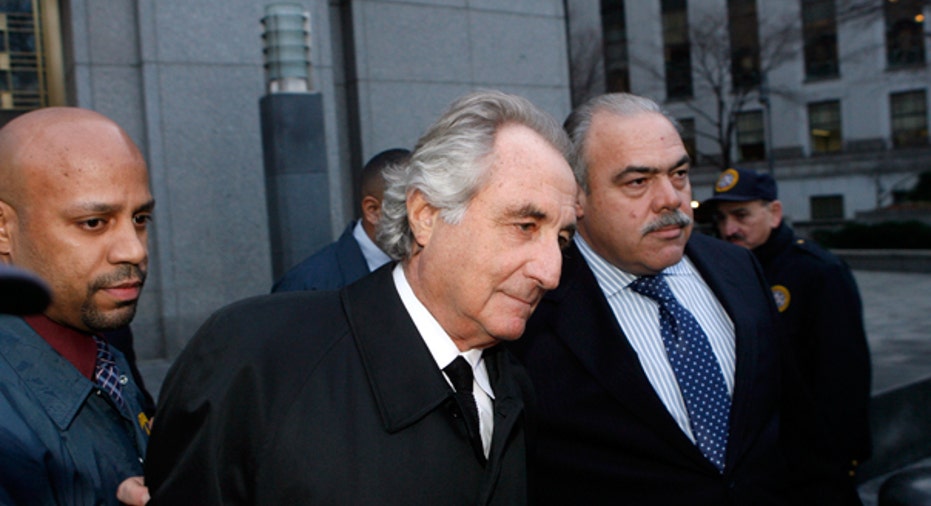Investor Advocates Blast JPMorgan's Madoff Deal

JPMorgan Chase’s (NYSE:JPM) roughly $2 billion deal to settle allegations the bank turned a blind eye to Bernard Madoff’s massive Ponzi scheme was harshly criticized Tuesday by investor advocates.
Much of the criticism targeted the government’s decision to allow JPMorgan, the largest U.S. bank by assets, to settle the allegations without either the firm or any individuals employed by the bank facing prosecution.
“I’m deeply disappointed,” said Ron Stein, president the Network for Investor Action & Protection, an investor advocacy group formed in the wake of the Madoff scandal. “The fact that no one is actually being prosecuted is an embarrassment to the Department of Justice.”
JPMorgan has agreed to pay a $1.7 billion fine to settle with the DOJ, and another $350 million to settle with the U.S. Office of the Comptroller of the Currency.
Under the terms of the deal, JPMorgan admitted it violated various laws that require banks to monitor their clients to protect against fraud and money laundering. Prosecution was deferred for two years to give the bank time to comply with reform measures stipulated in the deal.
Separately, JPMorgan has also agreed to a $543 million settlement with the bankruptcy trustee overseeing restitution for Madoff’s victims.
“JPMorgan Chase paying $1.7 billion for its criminal conduct helping Bernard Madoff’s Ponzi scheme is good, but still inadequate to stop what can only be called a one-bank crime spree. First, once again, not a single individual working for JP Morgan Chase has been held accountable. Banks do not commit crimes; bankers do,” said said Dennis Kelleher, CEO of Better Markets, Inc., an independent nonprofit investor advocacy group.
Kelleher noted that the only people punished in these types of deals when fines are levied in lieu of employee prosecutions are JPMorgan’s shareholders. “It is no penalty to let banks use shareholders money to pay fines,” he said. “Other people’s money is meaningless to lawbreakers."
The allegations that led to Tuesday’s settlement announcement essentially claimed that employees at JPMorgan failed to disclose to banking regulators their suspicions that Madoff was running a giant scam.
The bank has denied that any employee “knowingly” helped Madoff.
In documents made public as part of the agreement, the bank acknowledged that employees who worked with Madoff voiced suspicions about Madoff’s methods, specifically that his returns were too good to be true and that Madoff’s pointed lack of transparency regarding his methods raised obvious red flags.
Madoff kept accounts at JPMorgan from October 1986 until his arrest in December 2008, when the fraud unraveled, according to court documents filed by banking regulators. Over those 22 years “the Madoff Ponzi scheme was conducted almost exclusively through a demand deposit account and other linked cash and brokerage accounts held at JPMorgan,” the papers state. Virtually all deposits made by Madoff’s clients and nearly all redemptions paid to his clients flowed in and out of accounts held at JPMorgan, the documents state.
According to the papers, employees who worked with Madoff at JPMorgan began raising concerns internally about his methods as early as 1994. However, in at least one instance, any potential improprieties were overlooked because Madoff was generating huge fees.
"Zero Deterrent"
Over the years concerns were raised repeatedly within financial circles and even in the financial press that Madoff was possibly running a Ponzi scheme.
“JPMorgan chose to look the other way,” said Stein, adding that the fines announced Tuesday amount to a “drop in the bucket” for a bank the size of JPMorgan with total assets of $2.5 trillion.
Furthermore, the fines and the terms of the deal – notably the failure to prosecute – is unlikely to act as a deterrent, investor advocates said.
“It is stunning to me that not one executive at JPMorgan was punished for the transgressions the firm engaged in and its collective willful blindness when it comes to Madoff's Ponzi scheme. The fine has zero deterrent purposes and that is really unfortunate,” said Andrew Stoltmann, a securities lawyer who has represented investors in fraud cases.
JPMorgan has been criticized for waiting until after Madoff was arrested before filing a Suspicious Activity Report with U.S. banking regulators.
FBI Assistant Director in Charge George Venizelos said in a statement Tuesday that “it took until after the arrest of Madoff, one of the worst crooks this office has ever seen, for J.P. Morgan to alert authorities to what the world already knew.”
Instead, the bank raked in millions in fees from Madoff while simultaneously providing the fraud with a veil of legitimacy.
“While I’m pleased that the DOJ has investigated JP Morgan Chase and additional funds will be going to investors, I’m deeply troubled that the damage done by the bank’s malfeasance over the more than 20 years it handled the Madoff account dwarfs the punishment,” said Stein.
“The $1.7 billion (penalty) is a drop in the bucket given the thousands of investors who have lost their life savings due in large part to the bank’s systematic lax oversight, or worse. The small settlement combined with the lack of a prosecution amounts to a slap on the wrist,” he added.
In recent months JPMorgan has agreed to pay about $20 billion to settle all manner of allegations that the bank defrauded and misled both investors and regulators.
Madoff is serving a 150-year prison sentence after pleading guilty to the fraud in 2009.



















